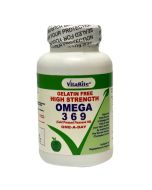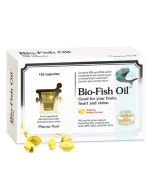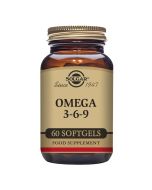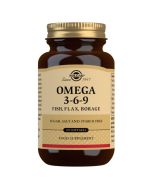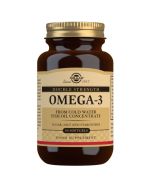
Why Omega-3 Fatty Acids are Important
What is Omega-3?
Omega-3 is an essential fatty acid. Your body cannot produce them on its own and so people typically obtain it through either diet or supplements. They play a crucial role in the body and are beneficial for health. There are three main types of omega-3 fatty acids1:
- Alpha-linolenic acid (ALA): This plant-based omega-3 is found in foods like flaxseeds, chia seeds, walnuts, and soybeans. ALA is a precursor to the other omega-3 fatty acids, meaning your body can convert small amounts of ALA into EPA and DHA, although the conversion process is not very efficient.
- Eicosapentaenoic acid (EPA): This type is mainly found in fish and other seafood. EPA is known for its anti-inflammatory effects and can contribute to the health of your heart and joints.
- Docosahexaenoic acid (DHA): Also primarily found in fish and seafood, DHA is important for brain and eye health, especially during the early stages of life.
What are the most common natural sources of Omega-3?
The most common natural source of Omega-3 is from the fish people consume in their diets. Salmons, Sardines, Markerel and other oily fishes generally have the highest amounts of Omega-3.2
That said there are also a range of vegetarian and vegan sources of Omega-3. Seaweed and algae are typically a good source of Omega-3, particularly EPA and DHA. You can also find Omega-3 in Flaxseed, Chia Seeds, Walnuts, Soybeans and hemp.
What are the health benefits of Omega-3?
Omega-3 fatty acids are incredibly beneficial for overall health, contributing to various physiological functions and offering protection against numerous conditions. Here are some of the key health benefits associated with regular intake of omega-3:
- Heart Health: Omega-3s are best known for their heart-protective properties. They help reduce blood pressure, lower triglycerides, slow the development of plaque in arteries, reduce the likelihood of abnormal heart rhythm, and decrease the risk of heart attacks and strokes.3
- Mental Health and Brain Function: There's a strong link between omega-3 intake and improvements in mood disorders such as depression. Omega-3s are also crucial for brain health, contributing to better cognitive performance and a lower risk of age-related mental decline.4
- Joint and Bone Health: By reducing inflammation, omega-3 can help manage the symptoms of rheumatoid arthritis, including joint pain and stiffness. There is also some evidence suggesting that omega-3 intake might help improve bone strength by boosting the amount of calcium in bones.5
- Eye Health: DHA, a type of omega-3, is a major structural component of the retina of the eye. Adequate levels of DHA can help prevent macular degeneration, one of the world's leading causes of permanent eye damage and blindness.6
- Inflammation Reduction: Omega-3 fatty acids can significantly reduce the production of substances linked to inflammation. This property is beneficial for treating or managing autoimmune diseases and chronic inflammatory conditions.7
- Pregnancy and Early Life: Omega-3s are crucial for brain growth and development in infants. DHA affects children's learning and behavior. Omega-3s are recommended during pregnancy and breastfeeding to boost the brain health of the baby.8
- Skin Health: DHA and EPA can help manage oil production and hydration of the skin. They can reduce premature aging of the skin and protect against sun damage.9
Is it more important to get EPA, DHA or ALA?
it does matter whether you consume more EPA, DHA, or ALA, as each type of omega-3 fatty acid serves different roles and benefits in the body. The choice between them often depends on your dietary habits, health goals, and specific nutritional needs.
EPA (Eicosapentaenoic acid)
- Mental Health: EPA is particularly effective at managing mood disorders, including depression.
- Anti-Inflammatory: EPA is known for its strong anti-inflammatory effects, making it useful for conditions like rheumatoid arthritis and reducing systemic inflammation.
DHA (Docosahexaenoic acid)
- Brain and Eye Health: DHA is crucial for brain development in infants and cognitive function throughout life. It also plays a vital role in maintaining eye health and visual development.
- Cardiovascular Health: Like EPA, DHA helps improve heart health by lowering triglycerides and blood pressure, though it's less potent than EPA in its anti-inflammatory effects.
ALA (Alpha-linolenic acid)
- Cardiovascular Benefits: ALA can help improve heart health by reducing cholesterol levels and the risk of cardiovascular disease.
- Conversion to EPA and DHA: ALA can be converted to EPA and DHA, although this process is inefficient in humans. ALA still provides its own cardiovascular benefits, but relying solely on ALA may not provide sufficient EPA and DHA for all the body’s needs.
It is worth remembering that if you are vegetarian or vegan, you might consume more ALA from plant sources like flaxseeds, chia seeds, and walnuts, since EPA and DHA are primarily found in fish and other marine sources. Vegetarians and vegans can also consider algae-based supplements, which provide DHA and sometimes EPA, to ensure adequate intake.
A balance of all three types is generally recommended for most people to support overall health.
How much Omega-3 should I take per day?
In general for overall wellness it is recommended that you take around 250-500mg of Omega-3 per day.
That said studies have shown that up to 5000mg of Omega-3 is safe for human consumption. At those levels there are questions about how much is actually being absorbed in the body though.
Is it better to take a vegan or fish form of Omega-3?
Typically we recommend taking Omega-3 that is derived from fish. The reason for this is because Omega-3 from fish contains EPA and DHA which are then well absorbed by the body and used by the body. Vegan forms tend to contain ALA. ALA has to be converted in EPA and DHA but this conversion process is not efficient which means a lot of the ALA you consume from vegan source Omega-3 isn’t used by the body.
That said, there is also a sustainability question with respect to Omega-3 derived from fish.10 Typically Omega-3 from fish has the risk that the fish may have been caught in an unsustainable way and if the brand is not high quality then they can sometimes not remove contaminants like mercury to ensure purity. In this respect it is always better to take high quality fish oil supplements; you can ensure the fish are caught sustainably and that the purity of the fish oil is carefully tested to ensure there’s no other nasties included.
What is the best time of day to take Omega-3 supplements?
Whilst there’s no optimal time to take Omega-3 supplements, we do recommend you take them with food. The reason for this is because Omega-3 is fat soluble, meaning that it dissolves into fat cells. As such if you eat it with food then you will ensure maximum absorption.
High quality fish oil supplements don’t tend to cause a fishy aftertaste or burps but if this is a concern for you then consider taking Omega-3 supplements before bedtime or just after dinner.
Is it better to take Omega-3 or Omega-3-6-9 Supplements
In the past it is believed that humans probably had a ratio of Omega 3:6:9 in their diets of 2:1:1. This means that they were consuming twice as much Omega-3 and they were Omega-6 and Omega-9.11
However the evolution of western diets means that now people often are getting up to 20x more Omega-6 than Omega-3.
In this respect we tend to recommend that people focus on omega-3 supplementing because they are likely getting plenty of Omega-6 and Omega-9 already.
Is it better to take Omega-3 Liquid or Capsules?
Both Omega-3 liquid and softgels absorb equally well so there’s no bioavailability benefit from taking either form.
Some people prefer liquids because it allows them to control their exact dose of Omega-3 each day however others don’t like the fishy taste.
High dose Omega-3 capsules or softgels can be quite large so that is off putting for some people. That said they are very unlikely to have a fishy taste at all so that can be easier for people to stomach.
References
1https://www.hsph.harvard.edu/nutritionsource/what-should-you-eat/fats-and-cholesterol/types-of-fat/omega-3-fats/
2https://www.nhs.uk/live-well/eat-well/food-types/fish-and-shellfish-nutrition/
3https://pubmed.ncbi.nlm.nih.gov/17324586/
4https://www.neurology.org/doi/10.1212/WNL.0000000000201296
5https://www.ncbi.nlm.nih.gov/pmc/articles/PMC7362115/#:~:text=Clinical%20studies%20have%20shown%20that,disease%20activity%20in%20rheumatoid%20arthritis.
6https://pubmed.ncbi.nlm.nih.gov/15555528/
7https://pubmed.ncbi.nlm.nih.gov/12480795/#:~:text=Animal%20experiments%20and%20clinical%20intervention,of%20inflammatory%20and%20autoimmune%20diseases.
8https://www.fda.gov/food/consumers/advice-about-eating-fish
9https://pubmed.ncbi.nlm.nih.gov/32463305/
10https://pubmed.ncbi.nlm.nih.gov/19087364/
11https://pubmed.ncbi.nlm.nih.gov/18408140/




